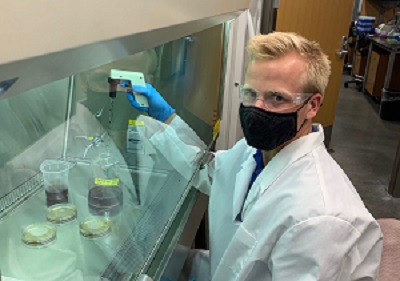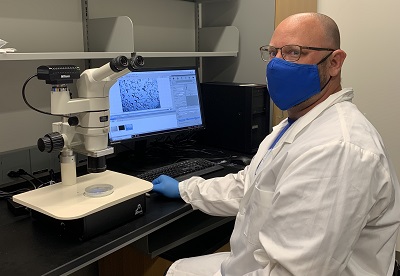Protein Precision
 Dr. Cynthia Damer, in the Department of Biology, was awarded a competitive grant of $424,000 by the National Institutes of General Medical Sciences. Using
Dr. Cynthia Damer, in the Department of Biology, was awarded a competitive grant of $424,000 by the National Institutes of General Medical Sciences. Using
this grant, Dr. Damer will spend three years studying the function of copine proteins, a group of proteins that can
be found in most organisms, ranging from simple single-celled organisms to multicellular animals, such as
humans. Though their exact function is unknown, their presence in most organisms leads researchers to believe they play an important role fundamental to life. Dr. Damer will use this grant to further her studies on copine proteins and provide clarity on their exact functions.
Dr. Damer and her team of graduate and undergraduate students, study copine proteins using Dictyostelium discoideum, single-celled organism that feeds on bacteria found in soil. However, when starved, Dictyostelium cells
will come together to form multicellular reproductive structures, allowing the team to study the function of copines
in basic cellular processes and development. Using Dictyostelium, grown in Petri dishes, the research team will
conduct various experiments, such as removing the genes that code for the copine proteins to see what cellular functions are lost, in  hopes of determining an exact function. Dr. Damer was drawn to the study of copine functions by her interest in membrane trafficking, the process of distributing proteins in and
hopes of determining an exact function. Dr. Damer was drawn to the study of copine functions by her interest in membrane trafficking, the process of distributing proteins in and
out of a cell. Copines are among the various proteins thought to be involved in membrane trafficking.
The National Institutes of General Medical Sciences grant money will go towards funding supplies and equipment in
Dr. Damer’s lab, such as a new stereomicroscope and camera to image Dictyostelium development. While the exact function of copines is unknown, they occur in high concentrations in human cancer cells. When the amount of
copines is reduced, the cancerous properties of a cell are also reduced. If Dr. Damer and her students are successful
in determining copine functions, their research may provide valuable insight that can aid in future cancer cell research.
At CMU We Do Research, We Do Real World
Story by ORGS intern Hailey Nelson
December 2021